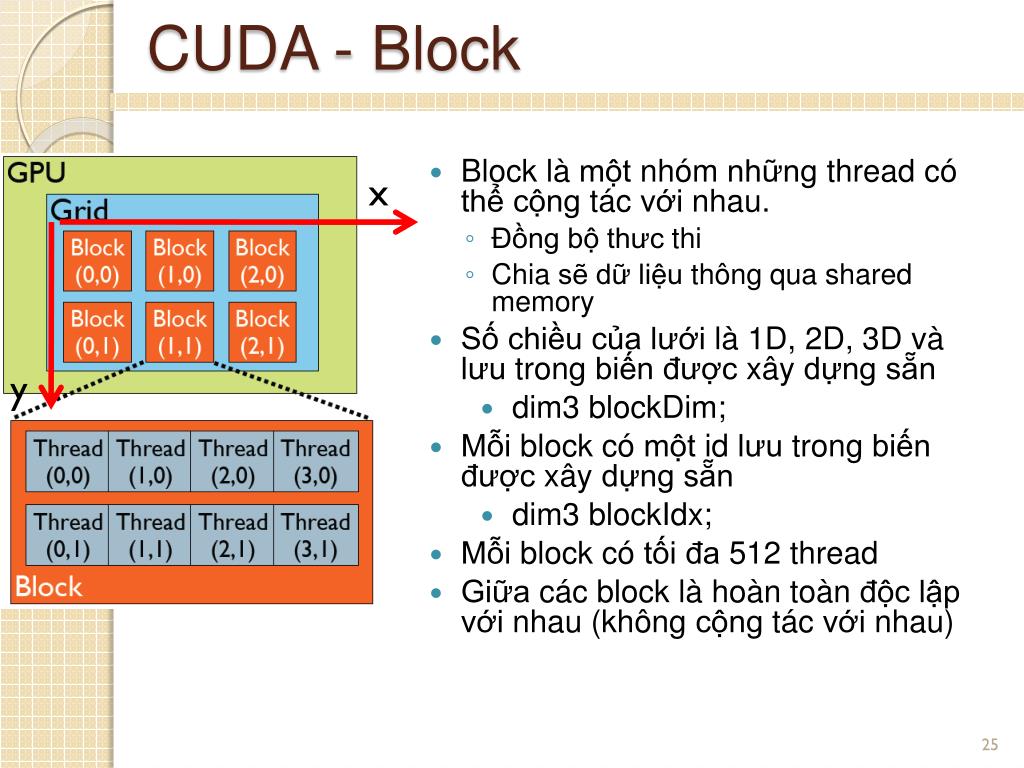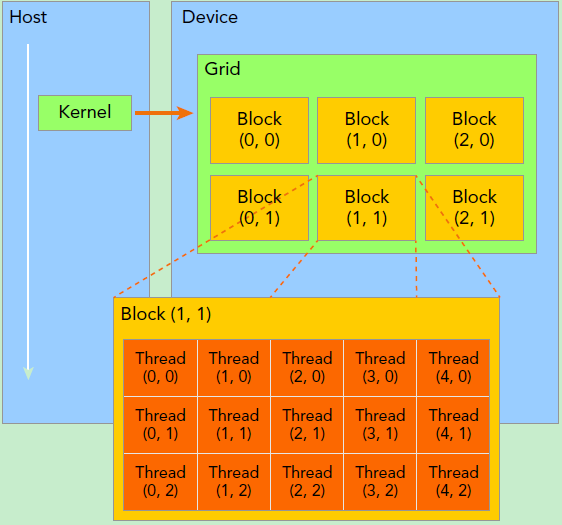

Old = atomicInc ( &addr, value ) // old = *addr *addr = ((old >= value) ? 0 : old+1 ) Old = atomicMax ( &addr, value ) // old = *addr *addr = max( old, value ) // increment up to value, then reset to 0 // decrement down to 0, then reset to value Old = atomicMin ( &addr, value ) // old = *addr *addr = min( old, value ) Old = atomicExch( &addr, value ) // old = *addr *addr = value Old = atomicSub ( &addr, value ) // old = *addr *addr –= value Old = atomicAdd ( &addr, value ) // old = *addr *addr += value ItĬan be freed in a different kernel, though.
Memory allocated in a kernel must be deallocated in a kernel (not the host).
#Cuda dim3 constructor free
cublas makes copies easier for matrices, e.g., less use of sizeof // copy x => yĬublasSetVector ( n, elemSize, x_src_host, incx, y_dst_dev, incy ) ĬublasGetVector ( n, elemSize, x_src_dev, incx, y_dst_host, incy ) ĬublasSetVectorAsync( n, elemSize, x_src_host, incx, y_dst_dev, incy, stream ) ĬublasGetVectorAsync( n, elemSize, x_src_dev, incx, y_dst_host, incy, stream ) ĬublasSetMatrix ( rows, cols, elemSize, A_src_host, lda, B_dst_dev, ldb ) ĬublasGetMatrix ( rows, cols, elemSize, A_src_dev, lda, B_dst_host, ldb ) ĬublasSetMatrixAsync( rows, cols, elemSize, A_src_host, lda, B_dst_dev, ldb, stream ) ĬublasGetMatrixAsync( rows, cols, elemSize, A_src_dev, lda, B_dst_host, ldb, stream ) Īlso, malloc and free work inside a kernel (2.x), but using column-wise notation // (the CUDA docs describe it for images a “row” there equals a matrix column) // _bytes indicates arguments that must be specified in bytesĬudaMemcpy2D ( A_dst, lda_bytes, B_src, ldb_bytes, m_bytes, n, direction ) ĬudaMemcpy2DAsync( A_dst, lda_bytes, B_src, ldb_bytes, m_bytes, n, direction, stream )

Wait until memory accesses are visible to block and device and host (2.x)ĬudaMemcpyToSymbol ( dev_data, host_data, sizeof(host_data) ) // dev_data = host_dataĬudaMemcpyFromSymbol( host_data, dev_data, sizeof(host_data) ) // host_data = dev_data // direction is one of cudaMemcpyHostToDevice or cudaMemcpyDeviceToHostĬudaMemcpy ( dst_pointer, src_pointer, size, direction ) ĬudaMemcpyAsync( dst_pointer, src_pointer, size, direction, stream ) Wait until memory accesses are visible to block and device Wait until memory accesses are visible to block ), for example:ĭim3 blocks( nx, ny, nz ) // cuda 1.x has 1D and 2D grids, cuda 2.x adds 3D gridsĭim3 threadsPerBlock( mx, my, mz ) // cuda 1.x has 1D, 2D, and 3D blocks Variable.x, variable.y, variable.z, variable.w.Ĭonstructor is make_( x.
#Cuda dim3 constructor code
Most routines return an error code of type cudaError_t.Ĭhar1, uchar1, short1, ushort1, int1, uint1, long1, ulong1, float1Ĭhar2, uchar2, short2, ushort2, int2, uint2, long2, ulong2, float2Ĭhar3, uchar3, short3, ushort3, int3, uint3, long3, ulong3, float3Ĭhar4, uchar4, short4, ushort4, int4, uint4, long4, ulong4, float4 Standard C definition that pointers are not aliased Declaring functions _global_ĭeclares kernel, which is called on host and executed on deviceĭeclares device function, which is called and executed on deviceĭeclares host function, which is called and executed on hostĭeclares device variable in global memory, accessible from all threads, with lifetime of applicationĭeclares device variable in constant memory, accessible from all threads, with lifetime of applicationĭeclares device varibale in block's shared memory, accessible from all threads within a block, with lifetime of block cu files, which contain mixture of host (CPU) and device


 0 kommentar(er)
0 kommentar(er)
